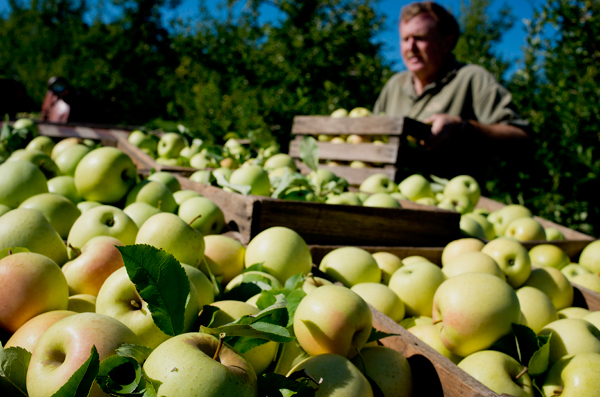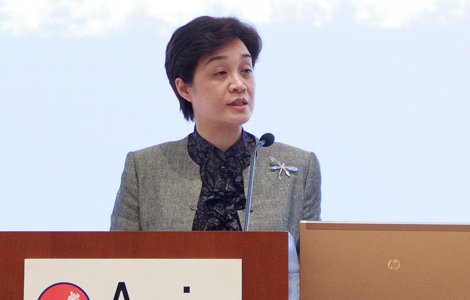China to open markets to all apples from US
Updated: 2015-01-28 05:49
By AI HEPING in New York(China Daily USA)
|
||||||||
 |
|
Ralph Hugus, owner of Hugus Fruit Farm, loads crates of apples onto a trailer in Rushville, Ohio, the United States. China has agreed to import all varieties of apples from the United States, the US Department of Agriculture said on Monday. Ty Wright / Bloomberg |
The agreement by China to sell all varieties of apples from the United States may increase US exports of the fruit by $100 million a year, said US Agriculture Secretary Tom Vilsack in announcing the deal that ends about a 20-year effort by US growers to gain broader access to the world's second-most populous country.
Reached over the past weekend after talks between the two countries were held in San Francisco, the agreement was announced on Monday by the US Department of Agriculture (USDA) and China. It is reciprocal, allowing Chinese apple growers to send their products to US consumers. China is the world's largest apple-growing nation, according to US apple growers, producing 1.9 billion boxes a year, mostly Fujis.
US apple growers have been trying to gain broader access to the Chinese market ever since China first allowed imports of Red Delicious and Golden Delicious apples in the early 1990s from Washington State, the primary grower. It stopped imports of those apples in 2012 because of concern over a fungus, and re-opened its borders to them last fall.
China bought $55 million worth of those apples in the 2010-11 marketing year. Reds and Goldens account for only 40 percent of the state's crop today, according the Washington Apple Commission, the Wenatchee-based organization charged with international marketing.
US fresh apple exports to China were valued at more than $1 billion in 2013, according to the USDA.
"With this new agreement, the apple industry estimates that within two years, exports to China will reach 5 million bushels annually, a value of nearly $100 million per year," Vilsack said Monday in a statement.
In a telephone interview with The Grand Rapids Press and MLive.com on Tuesday, Vilsack said, "It's a trade agreement that opens up millions of new middle-class consumers to new food products."
"We have 300 million people, they have 1.2 billion," he said.
Vilsack said the agreement also has the potential to expand US apple exports to other Asian markets and Cuba, where the Obama administration recently began taking steps to end the 50-year-old trade embargo. The agreement with China comes at a time of a record crop year for US apple growers, but they have been hurt by a West Coast port slowdown, a Russian ban on the import of agricultural products from the US, and the worldwide effects of the strengthening dollar, said Barbara Walkenhauer, chairwoman of the Washington Apple Commission board.
US apple exports to China will still have to pass scrutiny, but Danelle Huber, international marketing specialist for the commission, told the Yakima, Washington Herald that she expects containers to set sail in 30 to 60 days.
To capitalize on the agreement, Apple Commission officials were on their way Monday to Shanghai with samples of trademark varieties such as Pacific Rose, Envy and Jazz to woo potential importers, the newspaper reported.
Wang Miao, marketing director of the Washington Apple Commission in China, said that a full access to the Chinese market is an important opportunity for Washington's apple industry to expand exports.
"Although China is the largest global producer of apples, domestic varieties are very limited with Fuji apples accounting for around 85 percent of all production," he said. "We, on the other hand, have eight main varieties and more than 10 ‘club' (newly cultivated and limited production) varieties ready to be introduced to the Chinese market."
Diane Smith, executive director of the Michigan Apple Committee, said the agreement benefits Michigan growers even if the state does not end up selling many apples directly to China. Michigan is the nation's third largest apple producing state after Washington and New York.
"We want Washington to have the ability to export as much of their crop as possible," said Smith. "That would free up those domestic markets that Michigan likes to call home."
Smith said she doesn't know how large an export market China will become for Michigan growers, which grew about 30 million bushels of apples in 2014.
If Chinese-grown apples start arriving in US food stores, Smith said it is not clear what the impact will be.
"It's something we're going to be watching to make sure nothing is taking over our market share," she said. "There are steps you can take if there ever is a dumping situation. But at this point, I think it's going to be down to consumer preferences."
China already ships apples to several markets around the world and can sometimes compete, Huber said.
"Chinese apples are coming up to be similarly priced to Washington apples" in Southeast Asian markets, Huber told the Yakima newspaper.
Canada first opened its doors to fresh Chinese apples about 10 years ago. Stores saw a surge in demand right away, but it tapered off to almost nothing in the following years as they became more expensive, she said.
During the 2012-13 season, Canada imported only 242,000 boxes from China, according to Good Fruit Grower magazine, but more than 6 million boxes from Washington.
Mu Chen in Beijing contributed to this story.
aiheping@chinadailyusa.com

 Old photos of China's military parade
Old photos of China's military parade
 'Polar bear' roams in London, but don't panic
'Polar bear' roams in London, but don't panic
 The ancient practice of preserving and drying food
The ancient practice of preserving and drying food
 Snow job
Snow job
 Seniors enjoy swimming despite the chill
Seniors enjoy swimming despite the chill
 US, China expected to lead on climate talks
US, China expected to lead on climate talks
 Weighing in on justice in China
Weighing in on justice in China
 Northeastern US braces for 'crippling' blizzard
Northeastern US braces for 'crippling' blizzard
Most Viewed
Editor's Picks

|

|

|

|

|

|
Today's Top News
US, China expected to lead on climate talks
Weighing in on justice in China
China wants US to help build trust on maritime disputes
Yahoo to spin off Alibaba shares
China to open markets to all US apples
Parade will commemorate victory over Fascism
Expatriates to be lured for startups
Beijing gears up for Super Bowl
US Weekly

|

|








